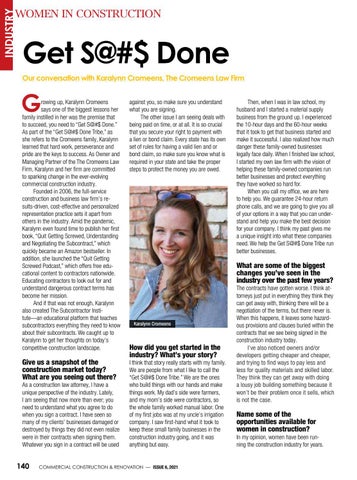INDUSTRY
WOMEN IN CONSTRUCTION
Get S@#$ Done Our conversation with Karalynn Cromeens, The Cromeens Law Firm
G
rowing up, Karalynn Cromeens says one of the biggest lessons her family instilled in her was the premise that to succeed, you need to “Get S@#$ Done.” As part of the “Get S@#$ Done Tribe,” as she refers to the Cromeens family, Karalynn learned that hard work, perseverance and pride are the keys to success. As Owner and Managing Partner of the The Cromeens Law Firm, Karalynn and her firm are committed to sparking change in the ever-evolving commercial construction industry. Founded in 2006, the full-service construction and business law firm’s results-driven, cost-effective and personalized representation practice sets it apart from others in the industry. Amid the pandemic, Karalynn even found time to publish her first book, “Quit Getting Screwed, Understanding and Negotiating the Subcontract,” which quickly became an Amazon bestseller. In addition, she launched the “Quit Getting Screwed Podcast,” which offers free educational content to contractors nationwide. Educating contractors to look out for and understand dangerous contract terms has become her mission. And if that was not enough, Karalynn also created The Subcontractor Institute—an educational platform that teaches subcontractors everything they need to know about their subcontracts. We caught up to Karalynn to get her thoughts on today’s competitive construction landscape.
against you, so make sure you understand what you are signing. The other issue I am seeing deals with being paid on time, or at all. It is so crucial that you secure your right to payment with a lien or bond claim. Every state has its own set of rules for having a valid lien and or bond claim, so make sure you know what is required in your state and take the proper steps to protect the money you are owed.
Give us a snapshot of the construction market today? What are you seeing out there?
I think that story really starts with my family. We are people from what I like to call the “Get S@#$ Done Tribe.” We are the ones who build things with our hands and make things work. My dad’s side were farmers, and my mom’s side were contractors, so the whole family worked manual labor. One of my first jobs was at my uncle’s irrigation company. I saw first-hand what it took to keep these small family businesses in the construction industry going, and it was anything but easy.
As a construction law attorney, I have a unique perspective of the industry. Lately, I am seeing that now more than ever; you need to understand what you agree to do when you sign a contract. I have seen so many of my clients’ businesses damaged or destroyed by things they did not even realize were in their contracts when signing them. Whatever you sign in a contract will be used
140
Then, when I was in law school, my husband and I started a material supply business from the ground up. I experienced the 10-hour days and the 60-hour weeks that it took to get that business started and make it successful. I also realized how much danger these family-owned businesses legally face daily. When I finished law school, I started my own law firm with the vision of helping these family-owned companies run better businesses and protect everything they have worked so hard for. When you call my office, we are here to help you. We guarantee 24-hour return phone calls, and we are going to give you all of your options in a way that you can understand and help you make the best decision for your company. I think my past gives me a unique insight into what these companies need. We help the Get S@#$ Done Tribe run better businesses.
What are some of the biggest changes you’ve seen in the industry over the past few years?
Karalynn Cromeens
How did you get started in the industry? What’s your story?
COMMERCIAL CONSTRUCTION & RENOVATION — ISSUE 6, 2021
The contracts have gotten worse. I think attorneys just put in everything they think they can get away with, thinking there will be a negotiation of the terms, but there never is. When this happens, it leaves some hazardous provisions and clauses buried within the contracts that we see being signed in the construction industry today. I’ve also noticed owners and/or developers getting cheaper and cheaper, and trying to find ways to pay less and less for quality materials and skilled labor. They think they can get away with doing a lousy job building something because it won’t be their problem once it sells, which is not the case.
Name some of the opportunities available for women in construction?
In my opinion, women have been running the construction industry for years.
